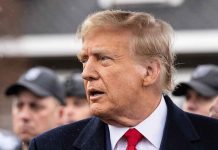
Ecuador’s President Daniel Noboa aims to strengthen collaboration with the U.S. in tackling key security and economic issues, but constitutional reforms could be crucial to securing the partnership.
Key Takeaways
- Noboa met with President Trump to discuss U.S. military collaboration against drug trafficking.
- The 2008 Ecuadorian constitution prohibits foreign military bases, but reforms are being considered.
- Economic and migratory issues were part of Noboa’s discussions with Trump.
- Military cooperation agreements between the U.S. and Ecuador were ratified by Noboa in 2024.
- Noboa’s approach faces criticism for heavy-handed tactics despite a murder rate drop.
Collaborative Talks with Trump
President Daniel Noboa of Ecuador recently held talks with U.S. President Donald Trump at Mar-a-Lago, aiming to explore U.S. military collaboration in tackling drug trafficking. These discussions are critical as Ecuador is grappling with rampant drug-related violence, and Noboa looks to address the issue through international cooperation. However, Ecuador’s constitution currently prohibits foreign military bases, creating a need for potential reform to facilitate this collaboration.
Ecuador saw military cooperation agreements with the U.S. in 2023, which Noboa ratified, showcasing an already established legal framework. Yet, he emphasizes compliance with local laws for any deployed foreign military, making it clear that Ecuador remains steadfast in safeguarding its sovereignty. Experts indicate that this regional collaboration could not only combat drug gangs but also support economic and migratory advancements.
Strategic Security and Economic Initiatives
Noboa also focused discussions on economic and migratory issues, underscoring existing bilateral maritime agreements. These discussions included a broader aim to combat illegal fishing, highlighting the multifaceted approach Ecuador seeks. “The United States is going to help patrol not only for drug trafficking, but also for illegal fishing, which affects us so much,” noted Noboa regarding the initiative.
Internally, Ecuador remains embroiled in a struggle against gangs that control drug routes, with estimates that 70% of the world’s cocaine passes through its ports. Noboa’s war-like strategies have resulted in a significant militarization of its streets and prisons. Critics argue over his heavy-handed tactics, though statistics show the murder rate has decreased by 16% from 2023 to 2024.
Challenges and Criticisms
Despite these efforts, challenges remain. Noboa’s partnership with Erik Prince, founder of the controversial Blackwater, has sparked concerns about potential rights abuses. His approach, though intended to be comprehensive, faces scrutiny for falling short on various campaign promises. Some critics cite failure in curtailing violence, further complicating his administration’s international aspirations.
Ecuador is exploring avenues to host a U.S. military base, which would mark a pivotal shift in the country’s military alignment. A new naval facility is under construction in Manta aimed at supporting U.S. personnel, indicating a proactive stance in anticipation of enhanced military cooperation.





